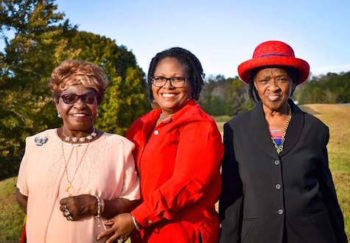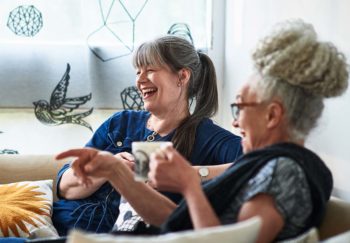With access to better healthcare, Americans are living longer than ever before. In fact, the National Council on Aging estimates that adults over the age of 65 will make up more than 20% of our population by 2040.
If you’re caring for an aging relative or heading into your golden years, odds are you’ve thought about how to live as well as possible, for as long as possible.
We turned to an expert for answers: Laurie Archbald-Pannone, MD, a specialist in geriatric medicine at UVA Health.
Read on to learn her tips and information on healthy aging, including signs of memory loss to watch for and when to talk to a provider about any concerns you have.
Signs of Normal Aging
First and foremost, rest assured that memory changes are totally normal as we age. Archbald-Pannone explains that seniors often have trouble with how well and quickly they recall information.
“As we age, pulling information from the back of the Rolodex of your mind can take longer,” says Archbald-Pannone. “For example, if someone in their senior years runs into someone they haven’t seen in a few decades at the grocery store, it’s not unusual for it to take them some time to remember the person’s name.”
Stay Sharp Mentally as You Age
Learn an expert's tips on preventing dementia.
Archbald-Pannone also says that it’s normal to misplace your keys or phone from time to time or to call someone by another friend or relative’s name. She explains that our brains work in many different ways, and it can be a sign of distraction or feeling tired rather than a symptom of dementia.
“It’s normal to process information a bit slower as we age and to sort information differently than we did in our younger years,” says Archbald-Pannone. “Many seniors will see a change in how well they can multitask, and that’s also something we expect to see on some level.”
Early Signs of Dementia to Watch For
While some changes are a normal and expected part of aging, Archbald-Pannone says that others are not. Concerning changes typically impact someone’s ability to live or function independently.
“A good example of a change to keep an eye on is if someone has lived in the same home for 20 or 30 years and they need to start using a navigation system to get to the grocery store,” explains Archbald-Pannone. “Another abnormal change would be if someone has difficulty remembering someone they see or speak to regularly.”
Daily Living Activities to Monitor
Dementia is a broad term, and Archbald-Pannone says that it generally changes a person’s ability to care for themselves. This usually means there’s an issue with instrumental activities of daily living (IADLs.)
IADLs include the following tasks:
- Shopping for groceries, household items, and general errands
- Managing money and paying bills
- Getting around, whether by driving or using public transportation
- Housekeeping activities such as cleaning and laundry
- Cooking or arranging for meal delivery or take-out
- Communicating with phones or email
- Filling prescriptions and taking medications as directed
“What these skills boil down to is an ability to complete tasks like purchasing food, paying for it, getting it home, preparing it, and cleaning up after yourself,” says Archbald-Pannone. “These are essential tasks that allow someone to live independently.”
In addition, a decline in activities of daily living (ADLs) is also something to watch for. ADLs include tasks such as:
- Bathing and dressing
- Getting around your home safely
- Using the restroom
- Personal hygiene
- Eating appropriately
When to See a Provider
Cognitive changes that might suggest dementia don’t happen overnight. Archbald-Pannone says that the changes often come on slowly, and it can be difficult to pinpoint exactly when they began.
She stresses that if you notice rapid-onset confusion or a swift decline in any of the skills listed above, it’s important to see a medical provider right away. There are other conditions, such as infections, mental health disorders, head injuries, thyroid disorders, or medication interactions, that can cause similar symptoms.
It’s also important to keep track of your medications and tell your doctor about any supplements, vitamins, or over-the-counter medications you take.
If you have early signs of dementia, a medical provider can offer screenings and a referral for further evaluation if needed. Archbald-Pannone says that diagnosing dementia is complex, and that it can’t be done without a proper evaluation.
“Dementia is a medical condition that impacts real people and real families,” reminds Archbald-Pannone. “Labeling people as having dementia when there’s no diagnosis isn’t helpful. Dementia is not something that can be diagnosed from afar based on a handful of behaviors.”
Healthy Aging Tips
While there’s a lot the medical and scientific communities are still learning about dementia and what causes it, there are some tried and true ways to maintain your health and memory for as long as possible. And Archbald-Pannone says that there’s no substitute for a healthy diet, plenty of hydration, and exercise.
“Staying physically active increases blood flow to your brain, keeps your brain engaged, and can boost cognitive function,” she explains. “Your brain also needs nutrients and water to function properly.”
Other tips include keeping up your social activities. Archbald-Pannone says that spending time with friends and loved ones, as well as having conversations regularly is a great way to boost your brain power.
That’s because your brain does a lot of work interpreting facial expressions, gauging someone’s mood, or anticipating their reactions. Puzzles, games, and learning new skills can be helpful too. It’s also important to treat or correct any hearing or vision loss since it can impact your overall cognition and lead to social isolation.
“Relationships with people we love and trust are so important,” says Archbald-Pannone. “In addition to keeping us engaged, it’s helpful to have someone looking out for us as we grow older.”


